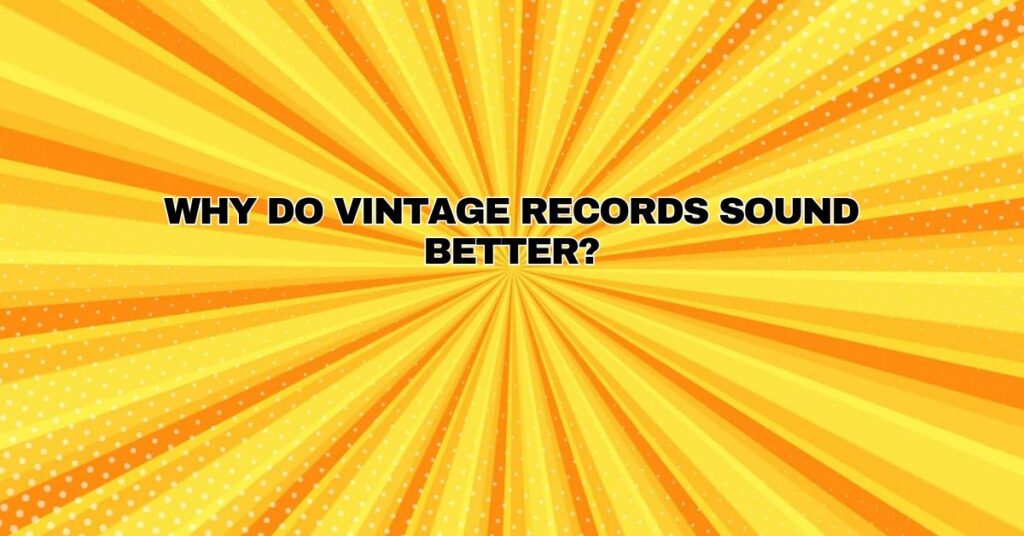In today’s era of digital music streaming and high-definition audio, the resurgence of vinyl records has left many audiophiles and music enthusiasts pondering an intriguing question: Why do vintage records sound better? This comprehensive article aims to unravel the mysteries behind the analog warmth and nostalgic charm that make vintage records a beloved medium for music aficionados.
The Analog Experience
Before diving into the reasons why vintage records are often perceived as superior, it’s crucial to understand the unique characteristics of analog audio.
- Continuous Soundwave: Vinyl records are an analog format, which means they capture and reproduce sound as a continuous, analog waveform. This contrasts with digital audio, which samples and quantizes sound into discrete values.
- Imperfect Realism: Analog audio can replicate the imperfections and nuances of a performance, capturing the warmth, depth, and texture of music. These imperfections contribute to the organic and authentic feel of analog recordings.
- No Compression: Vinyl records do not rely on audio compression, which is commonly used in digital formats to reduce file sizes. This allows for a more faithful representation of the original recording.
- Analog Playback: The act of playing a vinyl record involves the physical contact of a stylus on the grooves, creating an intimate connection between the medium and the listener.
Why Vintage Records Sound Better:
- Analog Warmth: One of the most significant reasons vintage records are revered is the analog warmth they provide. This warmth is often described as a rich, full-bodied sound with a pleasing saturation of harmonics. The continuous analog waveform captures subtle details and textures in music that can be lost in digital formats.
- Dynamic Range: Vinyl records offer a wide dynamic range, allowing for greater contrast between the softest and loudest parts of a recording. This dynamic range enhances the emotional impact of music, making it more engaging and immersive.
- Characteristics of Vinyl: Vinyl records have inherent characteristics that contribute to their sound quality. The material itself can impart a unique character to the music, with vinyl’s surface noise and occasional pops and crackles becoming part of the listening experience for some enthusiasts.
- Mastering Techniques: Many vintage records were mastered and pressed with meticulous care and attention to detail. This mastering process aimed to optimize the sound for vinyl, resulting in recordings that sound particularly well-suited for analog playback.
- Original Recordings: Vintage records often feature analog recordings made in studios that used analog equipment and techniques. These original analog recordings, when played on a vinyl medium, can deliver an exceptionally authentic and nostalgic listening experience.
- Collector’s Editions: Some vintage records have become collector’s items over the years. These rare editions often command premium prices and are highly sought after for their exceptional sound quality and historical significance.
The Role of Nostalgia
It’s important to acknowledge the role of nostalgia in the perception of vintage records. Nostalgia has a powerful impact on how we experience music, and many listeners associate vintage records with memories of a bygone era. This emotional connection can enhance the enjoyment of vinyl records and contribute to the perception that they sound better.
The Subjectivity of Sound
Ultimately, the perception of whether vintage records sound better than digital formats is highly subjective. Different listeners have diverse preferences and priorities when it comes to sound quality. Some may prioritize the warmth and character of analog audio, while others may prefer the pristine clarity and convenience of digital music.
Conclusion
The question of why vintage records sound better is a complex interplay of analog technology, mastering techniques, and the emotional connection to a bygone era. Vintage records offer a unique listening experience characterized by analog warmth, dynamic range, and the rich character of vinyl. For many enthusiasts, these qualities make vintage records a cherished medium for experiencing music in a way that transcends the precision of digital formats. Whether you’re a seasoned audiophile or a newcomer to vinyl, the appeal of vintage records lies in their ability to evoke a sense of nostalgia and offer a sonic journey back in time, where music was etched into grooves and played on turntables that continue to captivate the hearts of music lovers worldwide.


